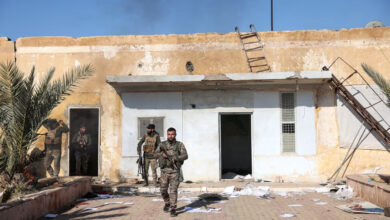Damascus–One day after US Secretary of State Hillary Clinton advised Damascus to move a way from its relationship with Tehran, Syrian President Bashar al-Assad and his Iranian counterpart President Mahmoud Ahmadinejad on Thursday stress that their ties are deep.
"I am surprised by their call to keep a distance between the countries … when they raise the issue of stability and peace in the Middle East, and all the other beautiful principles," Assad said.
"We need to further reinforce relations if the true objective is stability. We do not want others to give us lessons on our region, our history," the Syrian leader told a joint media conference with Ahmadinejad.
The Iranian president, who flew in to Damascus earlier in the day, stressed that ties between the two states, considered hardliners in their policies toward US ally Israel, were as "solid" as ever.
"Relations between Syria and Iran are brotherly, deep, solid and permanent … Nothing can damage these relations," he said.
On Wednesday, US Secretary of State Hillary Clinton said Washington has been pressing Syria — amid steps toward a normalization of US-Syria ties — to move away from Iran.
Ahmadinejad also renewed his prediction that Israel was "on the path to disappearing," echoing several past controversial forecasts that the Jewish state would be "wiped off the map" that stirred a strong international rebuke.
"If the Zionist entity wants to repeat its past errors, its death will be inevitable," said the Iranian president.
Assad, for his part, also defended Iran’s right to pursue uranium enrichment, despite the threat of new sanctions against the Islamic republic over its controversial nuclear program.
"To forbid an independent state the right to enrichment amounts to a new colonialist process in the region," he said.
The visit comes after Syrian Foreign Minister Walid Muallem said Damascus was determined to help Iran and the West engage in a "constructive" dialogue over Tehran’s nuclear program.
Western governments suspect that the Iranian nuclear program is cover for a drive to produce a bomb. Tehran vehemently denies the allegation.
The Iranian president’s last visit to Syria, a close ally of the Islamic republic for the past 30 years, dates back to May 2009.
Testifying in the Senate, Clinton was blunter than ever about Washington’s bid to drive a wedge between Damascus and Tehran.
Clinton said William Burns, the third-ranking US diplomat, "had very intense, substantive talks in Damascus" when he visited Syria last week, in the highest-level such US mission for five years.
Syria is being asked "generally to begin to move away from the relationship with Iran, which is so deeply troubling to the region as well as to the United States," she said.
Washington accuses Syria and Iran of supporting fiercely anti-Israeli groups, mainly Lebanon’s Shia militant movement Hizbullah and the Palestinian Islamist group Hamas which rules Gaza.
Iran and Syria are the main foreign backers of both groups but deny providing any military support.
On the nuclear front, Clinton also said on Wednesday that she hoped to see a UN Security Council resolution on a fourth set of sanctions against Iran in the "next 30 to 60 days."
But a defiant Ahmadinejad said on leaving Iran headed for Syria that the two countries would not be deterred.




